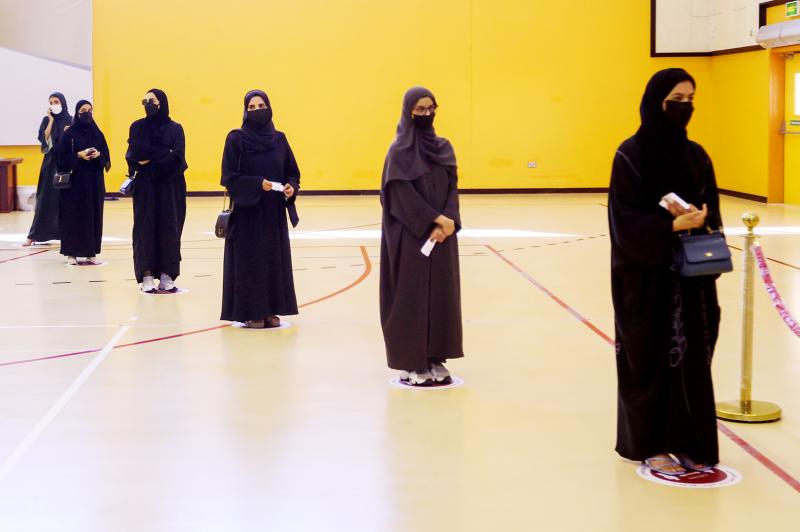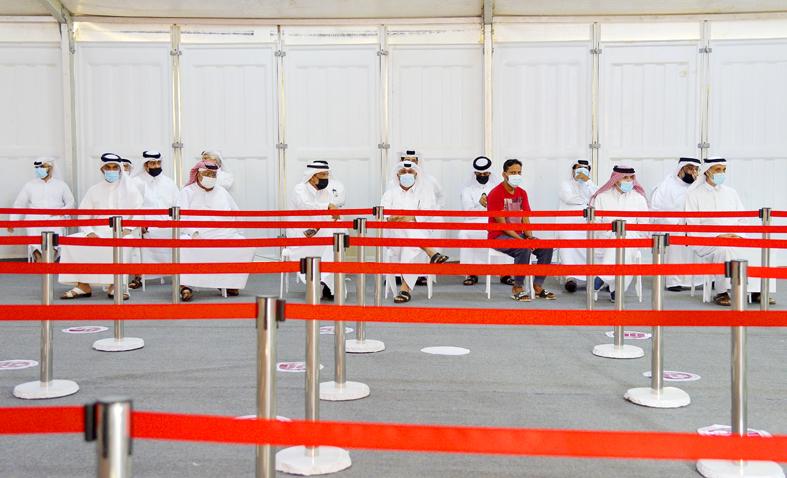Qataris yesterday began voting in the Gulf state’s first legislative elections for two-thirds of the advisory Shura Council in a vote that has stirred domestic debate about electoral inclusion and citizenship.
Voters began trickling into polling stations, where men and women entered separate sections, to elect 30 members of the 45-seat body. The ruling emir would continue to appoint the remaining 15 members.
“With the chance to vote, I feel this is a new chapter,” said Munira, a children’s book author who asked to be identified by only one name. “I’m really happy of the number of women standing as candidates.”

Photo: Reuters
The Council would have legislative authority, and approve general state policies and the budget, but would have no control over executive bodies setting defense, security, economic and investment policies for the small, but wealthy gas producer, which bans political parties.
Eighteen women are among the 183 candidates hoping to be elected at stations across 30 districts in the country, which has for several years held municipal polls.
Campaigning has taken place on social media, community meetings and roadside billboards.

Photo: EPA-EFE
“This is a first-time experience for me ... to be here and meet people talking about these things that we need,” said Khalid Almutawah, a candidate in the Markhiya District. “In the end we want to promote our society, and we try our best to help our people and our government.”
The election indicates that Qatar’s ruling Al Thani family is “taking seriously the idea of symbolically sharing power, but also effectively sharing power institutionally with other Qatari tribal groups,” Georgia State University’s Middle East Studies Center director Allen Fromherz said.
The election, approved in a 2003 constitutional referendum, comes ahead of Doha hosting the soccer World Cup next year.
However, critics have said that voting eligibility is too narrow.
Qatari Deputy Prime Minister Sheikh Mohammed bin Abdulrahman Al Thani last month described the vote as a new “experiment,” saying that the council cannot be expected from the first year to have the “full role of any parliament.”
Kuwait has been the only Gulf monarchy to give substantial powers to an elected parliament, although ultimate decisionmaking rests with the country’s emir, as in neighboring states.
The huge number of foreign workers in Qatar, the world’s top liquefied natural gas producer, means that nationals make up only 10 percent of the population of 2.8 million.
However, even then not all Qataris are eligible to vote.
The polls have stirred tribal sensitivities after some members of a main tribe found themselves ineligible to vote under a law restricting voting to Qataris whose family was present in the country before 1930.
Mohammed bin Abdulrahman Al Thani has said that there is a “clear process” for the electoral law to be reviewed by the next Shura Council.
Human Rights Watch has said that thousands of Qataris are excluded.
The organization said that Qatar arrested about 15 demonstrators at a protest led by Al Murra tribe members in August, as well as critics of the voting law.
A Qatari source with knowledge of the matter on Friday said that two critics remained in custody “for inciting violence and hate speech.”

Drug lord Jose Adolfo Macias Villamar, alias “Fito,” was Ecuador’s most-wanted fugitive before his arrest on Wednesday, more than a year after he escaped prison from where he commanded the country’s leading criminal gang. The former taxi driver turned crime boss became the prime target of law enforcement early last year after escaping from a prison in the southwestern port of Guayaquil. Ecuadoran President Daniel Noboa’s government released “wanted” posters with images of his face and offered US$1 million for information leading to his capture. In a country plagued by crime, members of Fito’s gang, Los Choneros, have responded with violence, using car

Two former Chilean ministers are among four candidates competing this weekend for the presidential nomination of the left ahead of November elections dominated by rising levels of violent crime. More than 15 million voters are eligible to choose today between former minister of labor Jeannette Jara, former minister of the interior Carolina Toha and two members of parliament, Gonzalo Winter and Jaime Mulet, to represent the left against a resurgent right. The primary is open to members of the parties within Chilean President Gabriel Boric’s ruling left-wing coalition and other voters who are not affiliated with specific parties. A recent poll by the

TENSIONS HIGH: For more than half a year, students have organized protests around the country, while the Serbian presaident said they are part of a foreign plot About 140,000 protesters rallied in Belgrade, the largest turnout over the past few months, as student-led demonstrations mount pressure on the populist government to call early elections. The rally was one of the largest in more than half a year student-led actions, which began in November last year after the roof of a train station collapsed in the northern city of Novi Sad, killing 16 people — a tragedy widely blamed on entrenched corruption. On Saturday, a sea of protesters filled Belgrade’s largest square and poured into several surrounding streets. The independent protest monitor Archive of Public Gatherings estimated the

Irish-language rap group Kneecap on Saturday gave an impassioned performance for tens of thousands of fans at the Glastonbury Festival despite criticism by British politicians and a terror charge for one of the trio. Liam Og O hAnnaidh, who performs under the stage name Mo Chara, has been charged under the UK’s Terrorism Act with supporting a proscribed organization for allegedly waving a Hezbollah flag at a concert in London in November last year. The rapper, who was charged under the anglicized version of his name, Liam O’Hanna, is on unconditional bail before a further court hearing in August. “Glastonbury,